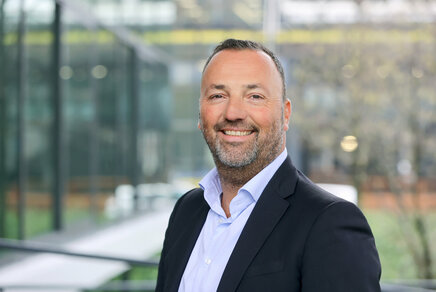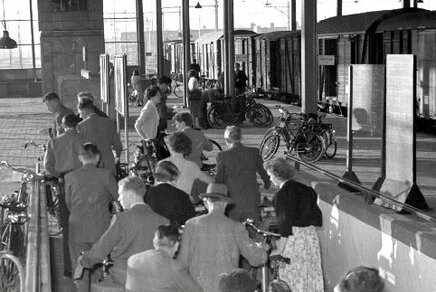Four Quantum Technology grants for TU/e quantum projects
Funding for the projects comes from Quantum Delta NL in collaboration with NWO.
![[Translate to English:] [Translate to English:]](https://assets.w3.tue.nl/w/fileadmin/_processed_/a/9/csm_NGF%20Quantum%20Banner%20image_901a1a0c1e.jpg)
Quantum proof security systems, optical tweezer arrays, quantum key distribution, and quantum computers based on neutral atoms are the topics covered in the four TU/e projects funded within the National Growth Fund (NGF) programme Quantum Technology, carried out by NWO in collaboration with Quantum Delta NL. And the researchers from all four funded projects are part of the Eindhoven Hendrik Casimir Institute (EHCI), the TU/e institute driving innovative research in photonics, electronics, and quantum technology.
The goal of Quantum Delta NL (QDNL) and NWO is to realize the much-needed scientific and technological breakthroughs in the field of quantum technology such as quantum sensing applications, quantum computing, and quantum networking.
As part of the 2023 funding call, almost 10.4 million euros was granted to 19 projects in the Netherlands. QDNL has reserved a total of 42 million euros for research and innovation over a period of seven years.
TU/e’s fourfold success
Of the nineteen successful projects, four are based at TU/e, with all researchers involved strongly connected with the Eindhoven Hendrik Casimir Institute (EHCI), The institute was officially launched in 2021, and is exploring the very latest in photonics and quantum technologies.
The four successful TU/e projects cover a wide range of topics related to the world of quantum. More information on these projects is available at the end of this article.
Quantum computing with neutral atoms
For her project AtomCOMP, Aida Todri-Sanial will explore quantum computers that are based on neutral atoms. A neutral atom is an atom that has an equal number of protons and electrons, which means that it is not charged. In quantum computers it’s important to cool the atoms used to store data as so-called qubits to very low temperatures. As it turns out, it’s easier to cool neutral atoms and easier to work with more neutral atoms than charged atoms.
Optical tweezers
An optical tweezer is a laser beam that can hold an atom, sort of like how a tweezer can grab a small object. When it comes to storing information in atoms in quantum computers, optical tweezers are very much needed. For their project, Oded Raz and Edgar Vredenbregt plan to enhance the capabilities of optical tweezers.
High-speed quantum key distribution
In the future it’s quite likely that you’ll send information with a little help from quantum key distribution (QKD), which is the secure sharing of information using secret keys that is based on quantum mechanics. For his funded project, Idelfonso Tafur Monroy wants to develop the first all-integrated, high-speed QKD transmitter.
Quantum proof security systems
There’s a lot of positivity out there with regards to quantum computers, but there are drawbacks when it comes to the success of quantum computing developments, one of which is that our current security systems can be broken with a large-scale quantum computer. For their project Extensions of Post-quantum CryptograpHy and Algorithms or EPOCHAL for short, Tanja Lange and Kathrin Hövelmanns want to design replacements for our current security systems.
Motivating for researchers
Servaas Kokkelmans, who is full professor at the Applied Physics and Science Education (APSE) department of TU/e and chair of the NWO Quantum Assessment Committee recognizes the importance of the Quantum Technology grants.
“The second Quantum Technology call was a great success. The successful proposals are spread across various areas of expertise in and application of quantum technology, and they all feed into the three catalyst projects of QDNL ,” says Kokkelmans. “Both the quality of the proposals and the success rate are very high. This is very motivating for the researchers and will significantly increase their involvement with QDNL.”
About Quantum Delta NL
Quantum Delta NL works on the development of quantum hardware and software, talent and ecosystem development, and societal impact. With the allocation of 615 million euros from the National Growth Fund in April 2021, Quantum Delta NL is rolling out a programme with three catalyst (CAT) programmes and four action lines.
In CAT-1, work is being done on Quantum Inspire, the first public European quantum computer in the cloud.
In the CAT-2 programme, the foundation is being laid for the next generation of digital infrastructure in the Netherlands, and a quantum internet network is being developed.
In CAT-3, companies and knowledge institutes are working together on development of the technology and applications of quantum sensing.
In addition, the programme includes action lines on all links of the ecosystem: research and innovation (Action Line 1), entrepreneurship and ecosystem development (Action Line 2), talent (Action Line 3) and societal impact (Action Line 4). The current call implements Action Line 1 – Research and Innovation.
Quantum Delta NL's mission is to further strengthen the thriving Dutch quantum ecosystem into the most relevant for Europe. The organisation was established in 2019 to implement the National Agenda Quantum Technology. In 2021, Quantum Delta NL's proposal received full honours from the National Growth Fund.
About the National Growth Fund
Through the National Growth Fund, the government will invest 20 billion euros in projects that ensure long-term economic growth from 2021 to 2025.
Among other things, the National Growth Fund invests in research, development, and innovation projects. In a number of these projects, NWO is involved as one of the implementing organisations, including for organising grant programmes for scientific research or scientific talent. Read more: https://www.nwo.nl/en/researchprogrammes/national-growth-fund
Media contact
More quantum and photonics research

![[Translate to English:] [Translate to English:]](https://assets.w3.tue.nl/w/fileadmin/_processed_/7/f/csm_BvOF%2001%20kickoff%20Future%20Chips%20Academy%20-%20group%20photo_5396222a83.jpg)
![[Translate to English:] [Translate to English:]](https://assets.w3.tue.nl/w/fileadmin/_processed_/a/9/csm_NGF%20Quantum%20Banner%20image_25d59cc135.jpg)
Latest news


![[Translate to English:] [Translate to English:]](https://assets.w3.tue.nl/w/fileadmin/_processed_/e/0/csm_BvOF%202019_1031_BHF%20license%20TUe%20ILI%20copy_8a50884392.jpg)